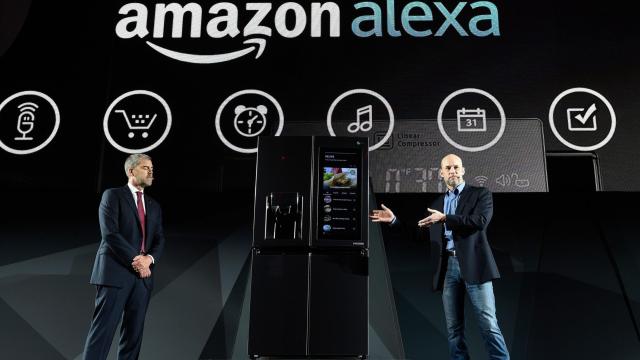Keen as ever to innovate around new ways to siphon data out of your home, Amazon is reportedly hard at work on a smart refrigerator that will be able to track your purchase habits, predict your food preferences, and give you health and nutrition advice you didn’t ask for.
On Tuesday, Insider reported that the new fridge — internally dubbed the not-at-all-ominous Project Pulse — utilises some of the same computer-vision technology that’s currently being used to power Amazon’s cashierless stores. By utilising automatic scanning, the smart fridge’s system will be able to keep stock of your food inventory and notify you when a product has exceeded its shelf life, and will also evaluate when you’re getting low on certain items so that you can reorder them from — where else — Amazon Fresh (or perhaps your local Amazon-owned Whole Foods Market).
While Amazon has been increasingly set on manufacturing its own devices as of late, the company is said to be in talks with several large consumer electronics brands that it could potentially partner with to manufacture the refrigerators. The dip into the home appliance market would put Amazon into more direct competition with big-name retailers like Samsung, LG, and General Electric — all brands the company sells via its online marketplace.
The smart fridge project is just the latest by Amazon designed to contribute troves of data to it its ever-expanding home surveillance dragnet. During the company’s annual September hardware event this year, executives concluded a presentation that had been rife with devices that record, surveil, and otherwise track users’ behaviour by announcing its pièce de résistance: Astro, a mobile home assistant designed to memorise your home’s floor plan, down to the rooms where your children sleep.
Although Amazon is relatively good at disguising these innovations as benign home technologies designed to make your life easier, their potential to erode privacy while flying undetected beneath the twin banners of “convenience” and “home security” shouldn’t be ignored.
While there’s currently no price estimate or expected release date for Project Pulse, anonymous sources told Insider that the price tag is expected to be “hefty,” given the relative complexity of the hardware involved. The target audience would reportedly be upper-income households who already subscribe to Amazon Prime.
